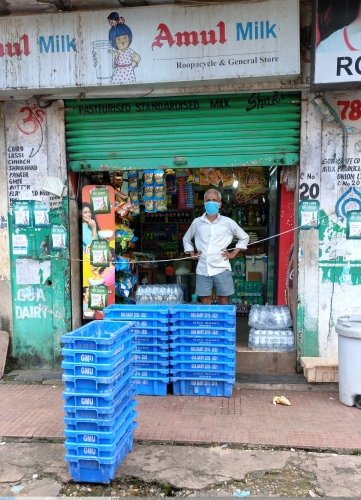Conceptualised by the CCP with support from GIZ and TERI, the campaign not only provides opportunities to help manage waste through citizen participation, but also create economic opportunities for entrepreneurs having space to deal in recyclable commodities

Dry waste management has been always looked at as anopportunity in Indian cities – anopportunity to earn from an entrepreneur’s view and an opportunity to reduceburden for urban services and divert waste to circular economy from a citymanagers and policy makers point of view.
In India, about 70% of plastic waste is recycled and only27% of total paper and cardboard waste generated gets recycled. There is a hugescope for increasing these recycling rates. Experts believe that recycling ofwaste against disposal creates 6 times more jobs, and in this post-Covidscenario where economy needs a boost, such opportunities need to be exploredfast.
Waste once segregated into different types and fractionsbecomes a useful resource and raw material. This not only saves energy andcarbon footprint by avoiding extraction of new raw materials, but reducesclimate impacts related to management of waste within a city. But whatincentives does a citizen have to segregate dry waste? This Gandhi Jayanti,Panaji is giving its citizen and tourists a reason to segregate – and buygrocery items using dry waste as a currency.
In Panaji, within municipal waste, recyclable items compriseof 13.25% glass, 1.49% metal, 7.29% paper, 13.24% plastics, and 7.16% textiles.CCP has a unique 5 way segregation policy in place which is now upgraded to 16way segregation. Another question that citizens ask is, if I segregate it mightagain get mixed in the value chain. Panaji has developed material processingfacilities which are well linked to dry waste collection centre in each of 12zones. Panaji’s citizens segregate their waste as a daily habit and hence thereis a strong need to take a step further to incentivize the people of Panaji fortheir novel efforts of waste segregation.
CCP with support from GIZ, a German Development Corporationand The Energy Resources Institute (TERI)-a national think tank, under wasteNAMA (Nationally Appropriate Mitigation Action) project thus designed the ‘Shop with your waste (SWYW)’ approach.
This unique campaign will not only provide opportunities tohelp manage waste through citizen participation, but also create economicopportunities for entrepreneurs having space to deal in recyclable commodities.
Under this campaign, registered shops will be permitted totrade PET bottles (clean, crushed and dried), carboard (flattened) and milk pouches(clean and dry) through a barter system against items of daily use likegrocery, electronics, medicine, cloth etc. These waste items have to be broughtin a minimum quantity displayed on the shop.
So, no money is required to buy that bread now, justsegregate and bring any of these waste items to a SWYW registered shop and takeit away! The shops taking recyclablewaste from generators will eventually be linked with a large-scale waste dealerwithin Panaji-21st Century Polymers Pvt. Ltd. who will buy therecyclables from them.
The implementation of this model will infuse a feeling ofvalue attached to every recyclable waste item and make citizens realize thatwaste is a resource. This will also leverage better socio-economic conditionsfor informal waste collectors and waste workers who will be able to exchangesegregated waste at multiple points for multiple daily need items.
The campaign launches on 2nd October 2020 with a grocerystore - Roopacycleand General store, Opposite Goa College of Pharmacy, 18 June Road, St. Inez,Panaji owned by Abdul Gaffar. The firsttransaction is to be made by the Municipal Commissioner of Panaji himself,Sanjit Rodriguez.
So come and shop with your waste! Readers interested to knowmore about the campaign are requested to visit CCP website www.ccpgoa.com for more details. Shop keepersinterested to participate in the campaign are requested to register at https://forms.gle/GpUFiNDPy9DfBX168 .